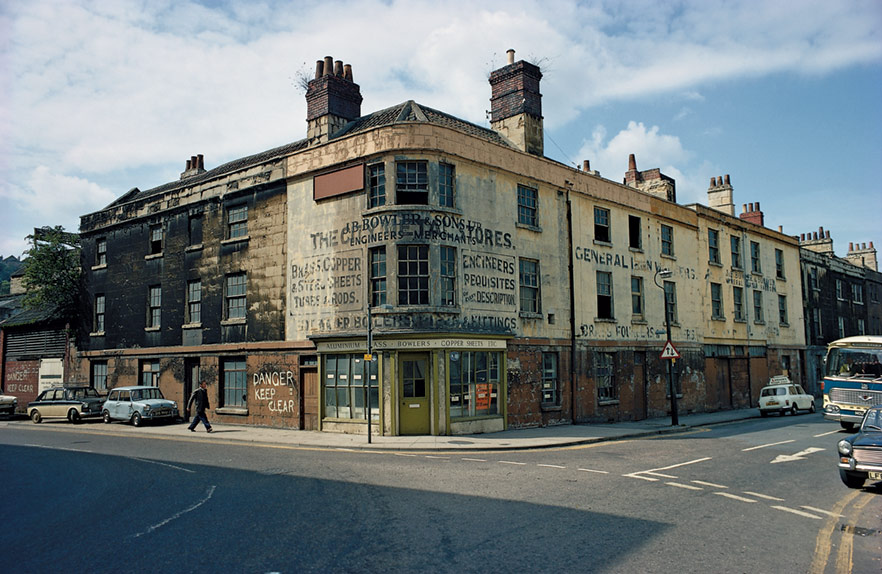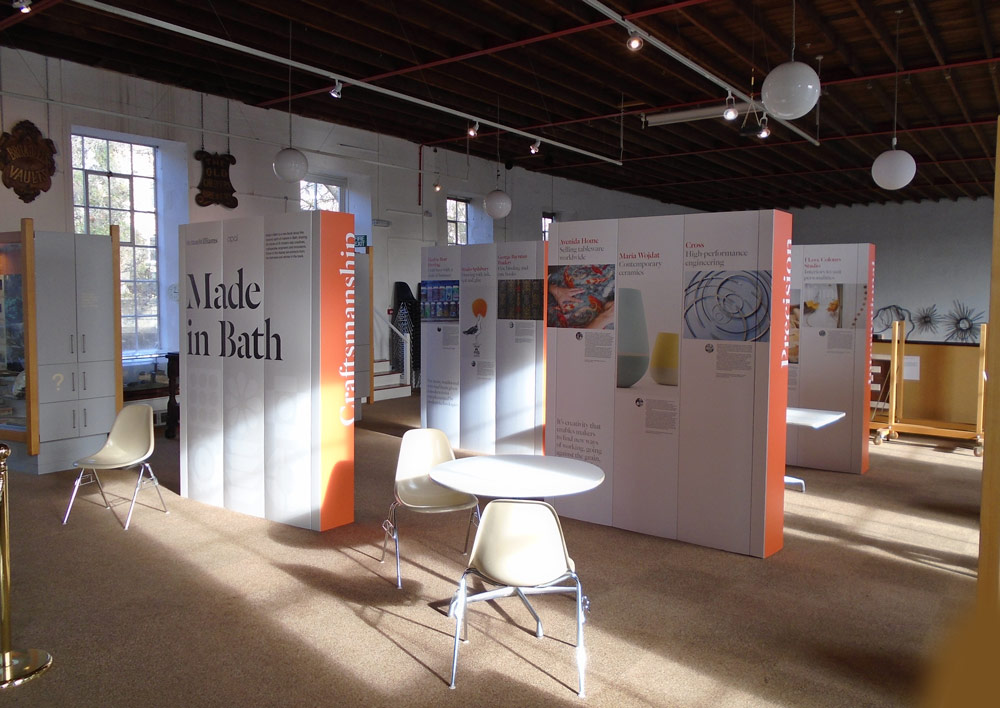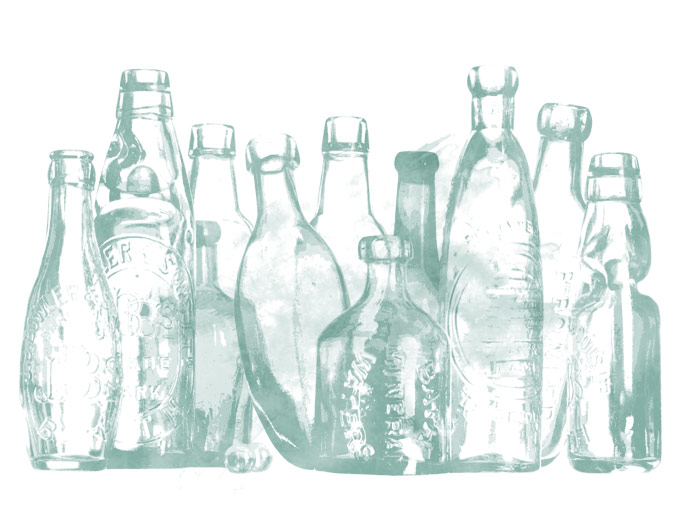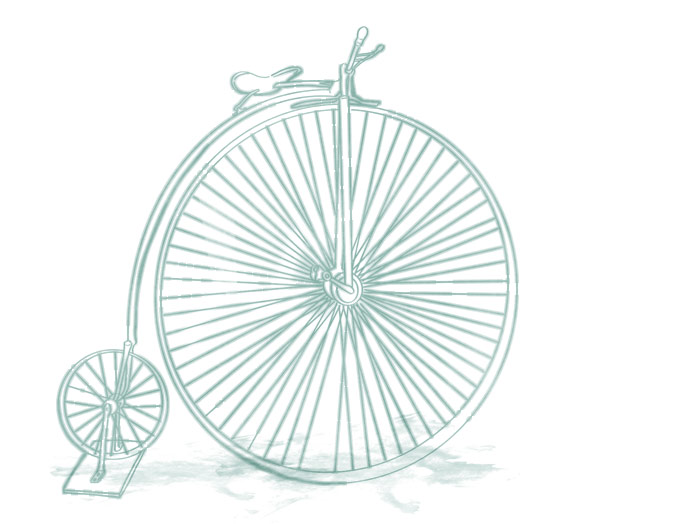About us
The Museum of Bath at Work is run by Bath Industrial Heritage Trust Ltd, and was set up in 1978.
Bath Industrial Heritage Trust Ltd has a Board of volunteer Trustees and just one paid employee, the Museum Director. The charity is currently fund-raising to secure the future of the Museum and its collections. We aim to increase our income from all sources to ensure our success for the next 40 years and beyond.
We benefit from long association with, and the most generous support from, a Charitable Trust which wishes to remain anonymous. We also acknowledge a generous gift in memory of the late Dr. Marianna Clark, one of the founders of the Museum.
We gratefully acknowledge the financial support of:
























“The Museum collection was initially built around the workshops, equipment, and stock of J.B. Bowler’s mineral water factory in Avon Street, which closed in 1969 when the premises was due for demolition. Local people, led by Russell Frears and Dr. Marianna Clark, worked tirelessly for several years to save the contents of Bowlers and to find it a permanent home. Bath Industrial Heritage Trust was set up to manage the Museum.”
“The unusual Grade II listed museum building was acquired on a long lease from the then Bath City Council in the late 1970s. Interior alterations were made to accommodate the Museum collections. It was built as a Real Tennis Court in 1777 and was also used as a riding school; the building has nineteenth-century additions dated around 1830 when it was converted to a brewery.”

Board of Trustees
“The Museum of Bath at Work is operated by Bath Industrial Heritage Trust Ltd, a registered charity and company limited by guarantee. There are eight Trustees who are Directors of the company, and one salaried employee, the Museum Director.”

Edward Cross
Edward is a qualified Mechanical Engineer and has worked for the last 30 years at Bath- based family firm Cross Manufacturing Co (1938) Ltd which makes specialised metallic seals and retaining rings for the Aerospace, Automotive and Power Generation Industries worldwide. He has been a director of the firm since 1999, which now has factories on three sites in the South West with over 500 employees. He was introduced to the Museum of Bath at Work by his late father, Michael Cross, who had been instrumental in helping to establish the Museum and who chaired it in the early days. Edward has been a Trustee of the Museum since 1995.
Ann Cullis (Company Secretary)
Ann started her career as an art history lecturer before moving to office management in the voluntary sector. With over two decades in local government across Swindon and Bath, she has worked in arts development, tourism, and event management, handling tasks from procurement to supporting voluntary organisations. Notably, she led Bath & North East Somerset Council’s World War 1 Centenary commemorations from 2014 to 2019, and wrote the souvenir publication. Active in several community groups in Bath including Friends of Bath Jewish Burial Ground CIO, she also volunteers as a Bath BID Welcome Ambassador. Fascinated by her family’s history, which includes various small businesses like pubs and tin-plate manufacturing, she feels a strong connection to Bath’s diverse trades showcased in the Museum of Bath at Work.
Dr Sara Frears
Sara’s affiliation with the Museum traces back to her father, Russell Frears, one of its founders, embedding the institution in her life since its inception in 1978. She studied Zoology at Aberystwyth and Aberdeen, followed by research roles in Aberdeen and Pretoria, South Africa. After teaching at the University of Otago, NZ until 1998, she focused on family responsibilities, including a house renovation in Bristol and raising children. Transitioning to education, she became a Museum Educator in Bristol City Museums from 2013. Sara’s career also includes a stint as a Family Support Practitioner, specializing in domestic abuse, and serving for many years as a school governor. Beyond work, she indulges in singing, piano, gardening, walking (especially with a dog), and baking bread, while supporting her adult children’s endeavours.
Professor (Emerita) June Hannam, Fellow of the Royal Historical Society
June joined the Museum of Bath at Work as a trustee in 2018 after a distinguished career in academia. For over 30 years, she taught history at the University of the West of England, where she held positions as Head of History, Professor of Modern History, and Associate Dean Research. With a PhD from Sheffield focusing on ’women’s work in Leeds, 1880- 1914,’ June has extensively published on socialism and feminism in Britain. Noteworthy works include a pamphlet on Mabel Tothill for Bristol Radical History and co-editing ’The British Women’s Suffrage Campaign: National and International Perspectives.’ Post- retirement, June actively promotes labour and women’s history in the South West, engaging with the Museum of Bath at Work, co-organizing the Larkhall History Society, and co-chairing the West of England and South Wales Women’s History Network. She also serves as a Patron of the Cleveland Pools project and contributes to Women’s History Review and Llafur, the Welsh Labour History Journal, as part of their editorial boards.
Euel Lane
Euel’s upbringing in Bath’s Broad Street was marked by frequent hospitalisations and irregular schooling. He entered the Civil Service in London, spending six years before returning to Bath. Initially a temporary position, Euel’s role with Bristol Omnibus Co. extended to 35 years, encompassing duties as a bus conductor, driver, coach driver, and tour guide. Later, Euel’s appointment to the Board of Directors of the First South West and Wales Pension Scheme saw him advising on pensions and overseeing Bath, Bristol, Weston-super-Mare, and Wells. In his spare time, he pursued history and architecture studies at Bath College and qualified as a Mayor’s Guide. Recognizing his passion for industrial archaeology through his extensive personal library, Museum Director Stuart Burroughs invited him to volunteer at the Museum upon his early retirement in 2003.
Professor Ann Sumner
Ann, an art historian, curator, and academic, champions audience engagement, especially in arts and industry. Notable works include co-authoring reports like the Joseph Wright of Derby Project and the Bringing out the Best Public Engagement Report. Educated in Bath, she held curatorial roles at renowned institutions before assuming leadership positions at the National Museum of Wales and the Barber Institute of Fine Arts. Her tenure as Director of Birmingham Museums Trust and Head of Cultural Engagement at the University of Leeds showcased her commitment to public art and heritage projects. Recognized for her contributions, she became a Fellow of Aberystwyth University and currently serves as a Visiting Professor at Manchester Metropolitan University. Actively engaged in cultural institutions, she chairs the Methodist Modern Art Collection, trustees Leeds Art Fund, and advises Aberystwyth University’s School of Art. Additionally, she leads fundraising efforts as Chair of the Fundraising Sub-Committee. Ann has an interest in furniture history and played a key role in the Chippendale 300 anniversary in 2018 and is particularly interested in the Bath cabinet makers Keevil and Sons. She is also an historian of tennis art and hugely inspired by our building’s history, being originally constructed as a Real Tennis Court in 1777.
Dr Trevor Turpin (Chair)
Trevor, an economics graduate from the Bath University, found his passion for Industrial Archaeology through mentor Angus Buchanan. After a season as a stage carpenter at the Liverpool Playhouse, he managed river pollution on the Bristol Avon. Further studies in Environmental Pollution Control led to a 30-year career as an environmental consultant, specializing in EIA of infrastructure projects. He served on the Board of the Institute of Environmental Assessment, was Director of Studies on the MSc Environmental Management at Bath University and co-authored the esteemed Environmental Impact Assessment Handbook. His academic pursuits expanded into Arts, Design, and the History of Technology, culminating in a doctorate on engineers’ environmental approaches. Trevor authored "Dam" and booklets for the Museum of Bath at Work. With diverse interests including vintage cars and Charlton Athletic, he joined the Museum’s Trustees in 2007, now serving as Chair of Bath Industrial Heritage Trust Ltd.
Geoff Wallis, C.Eng. MIMech.E
Geoff’s journey from Rolls Royce Aero Engines to founding Dorothea Restoration Engineers Ltd was catalysed by his volunteer work restoring Crofton steam pumps. Over 30 years, he spearheaded restoration engineering projects globally, collaborating with prestigious institutions like Historic England and the National Trust. As MD, he led efforts in architectural and structural metalwork, wind and watermill repairs, earning chartered engineer status in 1987. Post-retirement in 2007, he transitioned to consultancy, specializing in conservation surveys and project planning. Geoff’s contributions extend to academia, tutoring at British universities and leading courses in Architectural and Structural Metalwork Conservation at West Dean College. Actively involved in industrial heritage societies and conservation groups, he served as president of the Newcomen Society and the Bristol Industrial Archaeology Society. Alongside his wife, he established the Bulgarian Partners Trust, supporting humanitarian endeavours in Bulgaria.
Stuart Burroughs, Museum Director
Stuart, a Bath native, commenced his museum career at various institutions including the Glyn Vivian Art Gallery and Bristol Industrial Museum before becoming Director of the Museum of Bath at Work in 1992. Armed with degrees in History and Museum Studies, his professional pursuits intersect with his interest in Bath’s commercial development. Stuart is an esteemed author and lecturer, contributing to publications like History Today and The Newcomen Society. Notable works include "The World’s Crane makers: Stothert & Pitt" (1996) and "The Best for the Most with the Least: Bath and the Council House" (2013). He chairs the Bristol Industrial Archaeological Society, advises museums in Somerset and Bath, and indulges in filmmaking, bell ringing, and amateur music.
